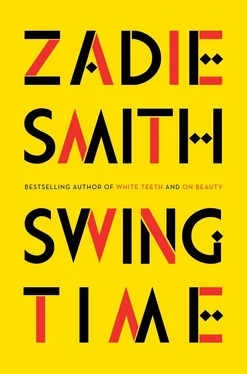Zadie Smith - Swing Time
Здесь есть возможность читать онлайн «Zadie Smith - Swing Time» весь текст электронной книги совершенно бесплатно (целиком полную версию без сокращений). В некоторых случаях можно слушать аудио, скачать через торрент в формате fb2 и присутствует краткое содержание. Город: NYC, Год выпуска: 2016, ISBN: 2016, Издательство: Penguin Publishing Group, Жанр: Современная проза, на английском языке. Описание произведения, (предисловие) а так же отзывы посетителей доступны на портале библиотеки ЛибКат.
- Название:Swing Time
- Автор:
- Издательство:Penguin Publishing Group
- Жанр:
- Год:2016
- Город:NYC
- ISBN:978-0-39956-431-4
- Рейтинг книги:4 / 5. Голосов: 1
-
Избранное:Добавить в избранное
- Отзывы:
-
Ваша оценка:
- 80
- 1
- 2
- 3
- 4
- 5
Swing Time: краткое содержание, описание и аннотация
Предлагаем к чтению аннотацию, описание, краткое содержание или предисловие (зависит от того, что написал сам автор книги «Swing Time»). Если вы не нашли необходимую информацию о книге — напишите в комментариях, мы постараемся отыскать её.
Dazzlingly energetic and deeply human,
is a story about friendship and music and stubborn roots, about how we are shaped by these things and how we can survive them. Moving from northwest London to West Africa, it is an exuberant dance to the music of time.
Swing Time — читать онлайн бесплатно полную книгу (весь текст) целиком
Ниже представлен текст книги, разбитый по страницам. Система сохранения места последней прочитанной страницы, позволяет с удобством читать онлайн бесплатно книгу «Swing Time», без необходимости каждый раз заново искать на чём Вы остановились. Поставьте закладку, и сможете в любой момент перейти на страницу, на которой закончили чтение.
Интервал:
Закладка:
Our second visit came four months later, in the rainy season. We arrived in darkness, after a delayed flight, and when we reached the pink house, I couldn’t get over the oddness of that place, the sadness and emptiness of it, the feeling I had of moving into somebody else’s broken ambition. Rain pelted the cab roof. I asked Fernando if he wouldn’t mind if I went back to Hawa’s compound.
“For me it’s very fine. I have a lot of work to do.”
“You’ll be all right? I mean, by yourself?”
He laughed: “I have been alone in much worse places.”
We parted at the huge, peeling billboard that marked the beginning of the village. I got soaked walking twenty yards, pushed open the aluminum door of Hawa’s family compound, weighted by an oil-can half filled with sand but unlocked as always. Inside was almost unrecognizable to me. In the yard, where there had been, four months earlier, neatly raked red earth, and grandmothers, cousins, nephews, nieces, sisters and many babies, sitting all around, late into the night, now there was nobody, only a churned mud-pit into which I immediately sank and lost a shoe. When I reached down for it I heard laughter. I looked up and realized I was being watched from the concrete verandah. Hawa and a few of her girlfriends, carrying the tin plates from dinner back to wherever they were kept.
“Oh-oh,” cried Hawa, laughing at the sight of me, bedraggled, and now carrying in my arms a large suitcase that refused to roll through the sludge. “Look what the rain brings!”
I had not expected to stay with Hawa again, hadn’t warned her, but neither she nor anybody else in the compound seemed very surprised by my arrival, and though I hadn’t been a particularly successful or well-loved house guest the first time round, I was welcomed like family. I shook hands with the various grandmothers, and we hugged, Hawa and I, and said how much we’d missed each other. I explained that on this trip there was only Fernando and me — Aimee was recording in New York — and that we were here to observe in further detail what was being done in the old school and what might be improved in the new one. I was invited to join Hawa and her visitors in the small living room, dimly lit with white solar, more keenly illuminated by the screens of each girl’s phone. We smiled at each other, the girls, Hawa, me. My mother’s and father’s health were politely asked after — it was again considered astonishing that I had no siblings — and then Aimee’s and her children’s health were asked after, and Carrapichano’s and Judy’s, but none more solicitously than Granger’s. Granger’s health was what they were really interested in, for Granger had been the real hit of the first visit, far more than Aimee or any of the rest of us. We were curiosities — he was loved. Granger knew all the cheesy R&B tracks that Hawa adored, Aimee disdained and I’d never heard of, he wore the kinds of sneakers she most admired, and during a celebratory drum circle, put on by the mothers at the school, without hesitation had entered the ring, brushed his shoulders, body-popped, vogued and performed the moonwalk, while I cringed in my seat and busied myself taking pictures. “That Granger!” said Hawa now, shaking her head happily at the thrilling memory of Granger, compared to the dull reality of me. “Such a crazy dancer! All the boys were saying: ‘Are these the new moves?’ And remember, your Aimee said to us: ‘No, these are the old ones!’ You remember? But he’s not with you this time? It’s a shame. Oh, Granger is such a fun guy!” The young women in the room laughed and shook their heads and sighed, and then a silence fell again, and it began to dawn on me that I had interrupted a get-together, a gossipy good time, which now, after a minute of awkward silence, resumed in Wolof. Not wanting to go to the complete darkness of the bedroom, I sat back in the sofa, let the talk wash over me and my clothes air-dry on my body. Next to me Hawa held court, two hours’ worth of stories which — from what I could tell — ranged from the hilarious to the mournful to the righteously offended but never stretched as far as anger. Laughter and sighs were my guide, and the photos from her phone which she flashed in the middle of certain anecdotes and cursorily explained in English if I made a point of asking. I gathered she had a love problem — a young policeman in Banjul whom she rarely saw — and a big plan, already anticipated, to go to the beach when the rains ended, for a family gathering, to which the policeman would be invited. She showed me the picture from this event the previous year: a panoramic shot that took in at least a hundred people. I spotted her in the front row and noticed the absence of scarf, instead she had a silky weave on her head, parted in the center and falling to her shoulders.
“Different hair,” I said, and Hawa laughed, put her hands to her hijab and removed it, revealing four inches of her own hair twisted into little dreads.
“But it grows so slow , oh!”
It took me a while to figure out that Hawa was that relative rarity in the village, a middle-class girl. The daughter of two university teachers, neither of whom I ever met, her father was working in Milan now, as a traffic warden, and her mother lived in the city and still worked at the university. Her father had taken what people in the village called “the back way,” along with Hawa’s elder brother, traveling through the Sahara to Libya and then finally making the dangerous crossing to Lampedusa. Two years later, by then married to an Italian, he sent for the other brother, but that was six years ago, and if Hawa was still waiting for her call she was far too proud to tell me. The money the father sent home had brought certain luxuries to the compound, rare in the village: a tractor, a large lot of private land, a toilet, though it was not connected to anything, and a television, though it did not work. The compound itself housed the four wives of Hawa’s dead grandfather and many of the children, grandchildren and great-grandchildren his unions had produced, in ever-changing combinations. It was never possible to locate all the parents to these children: only the grandmothers remained constant, passing babies and toddlers back and forth between themselves and to Hawa, who, despite her youth, often seemed to me to be the head of the household, or at least the heart of it. She was one of those people who attract everybody. Emphatically cute, with a perfectly circular, blue-black face, Disney-bright features, very pretty long eyelashes and something adorably duck-like in her full and forward upper lip. Anybody seeking lightness, silliness, or simply to be playfully teased for an hour or two knew to come to Hawa, and she took an equal interest in everybody, wanted to hear all news, no matter how apparently quotidian or banal (“You were just in the market? Oh, so tell me! Who was there? And was the fish man there?”). She would have been the jewel in the crown of any small village anywhere. She had, unlike me, no contempt whatsoever for village life: she loved the smallness, the gossip, the repetition and the closeness of family. She liked that everybody’s business was her business and vice versa. A neighbor of Hawa’s, with a more difficult love problem than her own, came by to visit us daily — she’d fallen for a boy her parents wouldn’t let her marry — and held Hawa’s hands as she spoke and wept, often not leaving till one in the morning, and yet, I noticed, she always left smiling. I tried to think of ever performing a similar service for a friend. I wanted to know more about this love problem, but translation bored Hawa, and in her impatient version two hours of talk was easily boiled down to a couple of sentences (“Well, she is saying he is very beautiful and kind and they will never marry. I’m so sad! I tell you I won’t sleep tonight! But come on: haven’t you learned even a little bit of Wolof yet?”). Sometimes, when Hawa’s guests arrived and found me sitting in my dark corner they would look wary and turn back, for just as Hawa was known everywhere as the bearer of lightness, someone whose very presence brought relief from woe, it was very soon clear to everyone that the visitor from England had brought with her only weight and sorrow. All the morbid questions I felt I must ask with a pen in my hand, concerning poverty reduction, or the lack of supplies at the school, or the apparent hardships of Hawa’s own life — to which were now added the difficulties of the rainy season, the mosquitoes, the threat of untreated malaria — all of this repelled our guests and severely tested Hawa’s patience. Political talk didn’t interest her — unless it was conspiratorial, intensely local and directly concerned people she knew — and she also disliked any too strenuous conversation on the topics of religion or culture. Like everybody, she prayed and went to the mosque, but as far as I could see she had no serious religious interest. She was the kind of girl who wants only one thing from this life: to have fun. I remembered the type very well from my own school days, girls like that have always mystified me — they still do — and I felt I mystified Hawa equally. I lay on the floor next to her each night, on our neighboring mattresses, grateful for the blue aura that came off her Samsung as she scrolled through her messages and photographs, sometimes well into the wee hours, laughing or sighing at pictures that amused her, breaking up the dark and relieving the need for conversation. But nothing ever seemed to outrage or seriously depress her, and perhaps because I saw so many things that elicited exactly these emotions in me, every day, I found myself consumed by a perverse desire to rouse the same feelings in her. One night as we lay side by side, as she again reflected on how much fun Granger had been, how cool and fun, I asked her what she made of the President’s promise to personally decapitate any homosexual he found in the country. She sucked her teeth and continued scrolling: “That man is always talking up some nonsense. Anyway, we have none of those people here.” She did not connect my question with Granger but I went to sleep that night burning with shame, that I should be so willing to casually destroy the possibility of Granger ever returning here, and for the sake of — what? Principle? I knew how much Granger had loved it here, even more than Paris — and much more than London — and that he felt this way despite the existential threat the visit had surely represented for him. We’d spoken about it often, it broke up the boredom of recording sessions — sitting in the booth together, smiling at Aimee through the glass, never listening to her sing — and these were the most substantial conversations I’d ever had with Granger, as if the village had unlocked in us a relation we did not know we had. Not that we agreed or made the same connections. Where I saw deprivation, injustice, poverty, Granger saw simplicity, a lack of materialism, communal beauty — the opposite of the America in which he’d been raised. Where I saw polygamy, misogyny, motherless children (my mother’s island childhood, only writ large, enshrined in custom), he remembered a sixth-floor walk-up, a tiny studio apartment shared with a depressed single mother, the loneliness, the food stamps, the lack of meaning, the threat of the streets right outside his front door, and spoke to me with genuine tears in his eyes of how happier he might have been raised by not one woman but fifteen.
Читать дальшеИнтервал:
Закладка:
Похожие книги на «Swing Time»
Представляем Вашему вниманию похожие книги на «Swing Time» списком для выбора. Мы отобрали схожую по названию и смыслу литературу в надежде предоставить читателям больше вариантов отыскать новые, интересные, ещё непрочитанные произведения.
Обсуждение, отзывы о книге «Swing Time» и просто собственные мнения читателей. Оставьте ваши комментарии, напишите, что Вы думаете о произведении, его смысле или главных героях. Укажите что конкретно понравилось, а что нет, и почему Вы так считаете.












